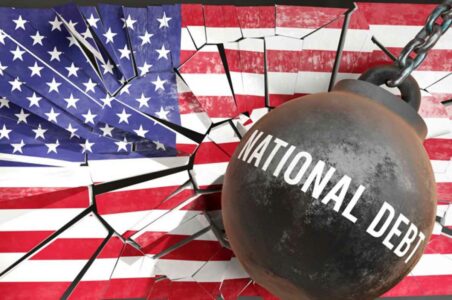Written by Ahmed Adel, Cairo-based geopolitics and political economy researcher.
On May 22, US Treasury Secretary Janet Yellen warned that the country may be unable to service its debt by June 1 unless Congress raises its ceiling or suspends it. In turn, President Joe Biden ruled out the declaration of default. At the same time, despite all the predictions of doom and gloom, the US could benefit from a default, especially to wreak havoc on the international economy and competitors.
In the US, the amount of public debt is limited by law. Currently, it has reached $31.4 trillion. It is up to the US Congress to raise the national debt ceiling, but this year the issue became a major contention between Republicans and Democrats. The Republican party, with a majority in the House of Representatives, set a condition: it will vote to raise the ceiling if the Democratic government accepts significant cuts in budget spending.
Specifically, the Republicans propose cutting tax credits for the purchase of electric cars and the installation of solar panels, as well as reducing public spending on the repayment of educational loans. For Democrats, if they want to win the 2024 presidential election on their terms, these conditions are unacceptable.
No economic reasons for default prevent raising the public debt ceiling. Still, there are political reasons. The Republican majority in the US House of Representatives want to bring greater accountability to the Biden Administration, which has been making economic decisions without consulting Congress. The Republicans hope to catch the Biden Administration, the Federal Treasury, the State Department, and the Defense Department violating American law.
There is a low chance of default in Washington, but this does not rule it out entirely because a default can be used as a financial weapon capable of unleashing a global economic crisis which will also affect the US’s main competitors. It is much easier and more politically legitimate to default in the context of increasing global military and political tensions. For this reason, it cannot be entirely ruled out that Biden will pursue such a path.
Likewise, the US could use default to influence other countries. Despite the enormous debt figure of $31.4 trillion, the external debt is only $7 trillion. Consequently, some countries —which Washington will want to target economically and geopolitically— may be the victims of this default.
Even so, the main thing for the US is not to let doubts about the sustainability of its economy and debt loom. If a default occurs, it will be more difficult for the US to obtain loans because the reliability and lack of alternatives to these investments will be questioned. In this case, depositors will invest in US securities and others.
For this reason, the probability of default is low because many tools exist to avoid it. Article 14 of the Constitution could be invoked, which states that the US debt cannot be called into question. Also, the Federal Reserve could easily double its balance sheet and buy all foreign debt.
On May 24, the US House of Representatives speaker, Kevin McCarthy, acknowledged that the Republicans and the White House maintain substantial discrepancies on the increase in the public debt limit requested by the Biden administration. The senior official expects to negotiate with the president daily until an agreement is reached.
Even if Republicans and Democrats overcome the impasse, it is recalled that in 2011, the last time the two parties had such fiscal odds, the most severe turmoil happened after a deal was struck, which saw shares fall the most steeply since the 2008 financial crisis. This was also amid worries about the impact of the spending cuts made to get the agreement and the implications of a downgrade in America’s bond rating by one credit rating agency.
Fitch Ratings on May 24 put the US on a negative watch – the first step toward a downgrade in the country’s rating by the major credit ratings firm. The credit agency cited “increased political partisanship” and weak governance compared to other countries that hold its top rating.
“The brinkmanship over the debt ceiling, failure of the US authorities to meaningfully tackle medium-term fiscal challenges that will lead to rising budget deficits and a growing debt burden signal downside risks to US creditworthiness,” the company said.
All this signals that the US is on the economic brink. What is most alarming, though, is that if the US was to default, it might not do so quietly and calmly but instead use an opportunity to bring down the world economy to hurt enemies and partners alike.


